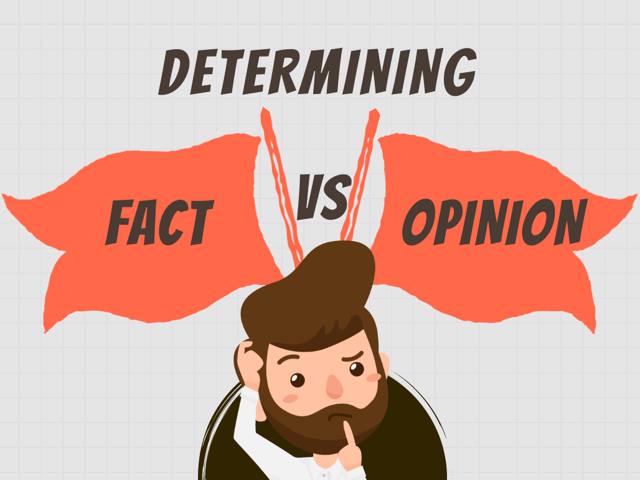
Determining Fact Vs. Opinion
The ACCUPLACER Next Generation Reading Test will measure your ability to discern the difference between a fact and an opinion. Although this may initially seem to be a straightforward task, many writers try to muddle the differences between the two, presenting opinions as though they are facts. Learning to tell the difference between the two will aid greatly in all aspects of reading and writing, and the evaluation of each. It can also inform your own writing so you write with clarity and integrity.
Facts
A fact is something that has been tested and proven to be true. Opinions can sometimes seem to be factual. If, for instance, Dave has told Sandy, “Blue is my favorite color,” this may seem like a fact, but Dave could easily change his mind the very next moment, and instead declare that purple has captured his heart’s attention. Facts are pieces of information that have been proven to be true, whether through empirical data, research, or historical data.
Facts are objective, or are based in evidence, while opinions are subjective, or based in perception. Facts can be discerned when evaluating seemingly subjective topics, such as human development.
Opinions
What qualifies as an opinion? In short, an opinion is anything that cannot be measured or rooted in factual evidence. While this may initially seem clear-cut, it can be difficult to spot a well-constructed opinion, as is often seen in op-ed pieces in newspapers; these pieces are designed to make the author’s opinion seem grounded in fact, and therefore, infallible.
Even in these situations, though, there are ways to determine whether something is factual or an opinion: go back to the source material. For instance, a fact could be:
58% of children in single-parent households exhibit significant behavioral issues in school.
Although this statistic (fabricated for illustrative purposes) would have to be based in sound data, an opinion could seem to be factual in saying,
58% of children are severely emotionally damaged by divorce.
Using the 58% referenced in the stat above makes the opinion seem to be grounded in reality, but the fact merely states that a certain percentage of children have behavioral issues, without going into the reasons for the statistic. Opinions can easily take on the face of facts, but will carry some amount of manipulation or slant.
Practice an Easy One, First
Facts and opinions can be difficult to discern.
George Washington was the first president of the United States.
This is a fact. But check this one out:
George Washington was the best president the United States has ever seen.
This is an opinion. These are easy to determine: the sequence of presidents is not at all difficult to verify, while the efficacy of his term can be interpreted in myriad ways.
How Do You Deal With Harder Ones?
When trying to determine whether something is a fact or an opinion, research is key. Can the claim stated be supported by empirical evidence? Is it from a reputable source? When looking for a fact, look at the source material to verify how accurate and unbiased a statement actually is.
Keep Reading

ACCUPLACER Test Blog
What’s a Good Score on the ACCUPLACER?
The ACCUPLACER test, particularly in its latest incarnation as the Next…

ACCUPLACER Test Blog
How to Do Well on the ACCUPLACER Essay
Navigating the ACCUPLACER essay, also known as the WritePlacer, can fee…

ACCUPLACER Test Blog
Essay Writing Practice and Prompts for the ACCUPLACER
The essay portion of the ACCUPLACER is the WritePlacer®. It evaluates y…